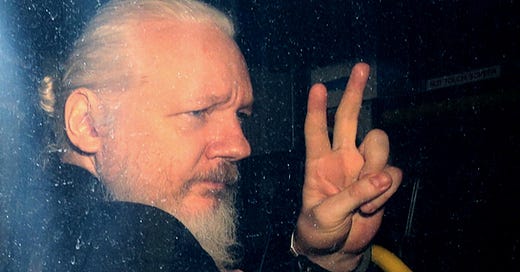Today marks the two-year anniversary of Julian Assange’s April 11, 2019 arrest in London to face charges in the United States for conspiring with Chelsea Manning to hack Department of Defense computers in 2010.
Two years of imprisonment as he fights extradition to the United States. Held at Belmarsh Prison in “atrocious” conditions and amid COVID outbreaks inside the walls, where he was previously (and possibly still) denied adequate access to his attorneys. Denied bail despite U.S. extradition efforts being unsuccessful so far.
It’s really nine years of imprisonment. Assange was granted asylum in the Ecuadorian embassy in 2012, residing there as a political hostage until the authorities came to get him two years ago.
The prosecution isn’t about the hacking.
Despite the crimes being committed in 2010, the Department of Justice didn’t obtain a grand jury indictment of Assange until March 2018. In June 2020, Assange was hit with a superseding indictment – which included charges for the “Unauthorized and Receiving of National Defense Information” and the “Unauthorized Disclosure of National Defense Information.” All for conduct that had mostly been public knowledge for years.
A lot has been said about how this prosecution is a danger to the free press. And that is true. Glenn Greenwald and Micah Lee observed how the Assange indictment poses such a grave threat to press freedoms:
It characterizes as a felony many actions that journalists are not just permitted but required to take in order to conduct sensitive reporting in the digital age.
Forget the myth – the law isn’t blind.
There’s no question that Assange is prosecuted for what he has disclosed, and not for the act of disclosure itself. We find circumstantial evidence for this proposition by the action and inaction of the U.S. government. The U.S. has taken the position that some unauthorized disclosures of secret information – that which might get the leaker or the publisher charged, to be consistent – are not just acceptable but preferred.
Where are the charges for the leak of General Flynn’s call with Russian Ambassador Kislyak?
Who was brought to justice for leaking Trump’s calls with Australia and Mexico?
Was former FBI Director James Comey prosecuted for leaking confidential memos?
I could go on, but you get the point. In each of those cases, the application of the law was based on the victim (Trump or those in his administration vs. the U.S.) and not the act itself. Laws can be said to be a means to achieve moral ends. Selective prosecutions, then, would be immoral means to serve immoral ends.
As we protest the Assange prosecution we must acknowledge its truth: that Justice at the highest levels in the U.S. is self-interested, not blind.




Both right/left should be outraged at the treatment he's received #FreeAssange
Why didn't President Trump pardon him?